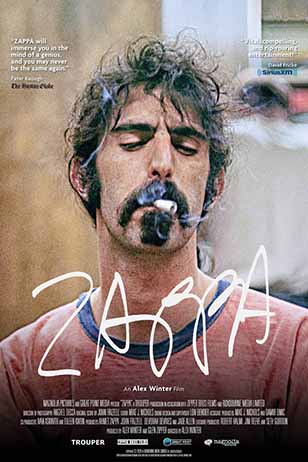 ZAPPA, US, 2020. Directed by Alex Winter. 129 minutes. Rated MA, Strong animated sex scene.
ZAPPA, US, 2020. Directed by Alex Winter. 129 minutes. Rated MA, Strong animated sex scene.
Audiences will come to this documentary-portrait with different expectations. Many younger viewers, since it is almost 30 years since the death of Frank Zappa, may not know him at all. Others will have heard of him in passing, while others will be well versed in his life and music. All these potential audiences including his admirers, critics and those who just want to be reminded of who he was, his musical heritage and what he achieved, will not be disappointed.
As an actor, Alex Winter is best known for Bill and Ted movies and TV series, but he is also a long-time documentary director. He has been in the show business for many decades, which is evident in the range of talking heads incorporated into the documentary – Zappa’s wife and children, colleagues, co-workers, and a range of celebrities.
American singer-songwriter Frank Zappa was born in 1940 and died in 1993. We learn of his Italian origins, migrant tradition, growing up in the 1940s and his education in the 1950s. When the enormous changes of the 1960s occurred, Zappa was ready to embrace them.
While he lived something of a wild lifestyle, in common with many rock stars, Zappa did not consider himself a hippy and was against drugs. In fact, he was something of a perfectionist in his work and in his expectations of himself and others.
For those unfamiliar with him and his work, the fact he was such an international figure may come of a surprise. Throughout this film there are excerpts from various international concerts, especially European countries.
Of course, a great deal of attention is given to his music. While he had quite a range of rock music and performance, this was not exclusive. In fact, as well as rock music, he composed pop, jazz, jazz fusion and orchestral. Indeed, Zappa was something of a classical composer – and, once again, there are a number of excerpts of performances of this style of music.
We see the founding of the band Mothers of Invention. A great number of musicians who worked with Zappa talk about how he changed their lives and careers, especially the devoted Ruth Underwood.
Out of the limelight, Zappa seems to give an impression ordinariness – particularly when being interviewed about his wife and relationship with her, and his children. The calm Zappa is seen especially when he is showing the director and the crew around his enormous archive of compositions, recordings, performances, all meticulously ordered and dated.
Throughout the film there are clay figures. The story is told about how clay sculptor Bruce Bickford encountered Zappa and how his figurines so delighted Zappa that he became a significant figure in Zappa’s life and career.
Other than passing references, this reviewer is unfamiliar with Frank Zappa, however he is sure that many audiences will join with this reviewer and be thankful for such a rich dramatic portrait, the heritage of music, the cultural challenges of the second part of the 20th century.
Umbrella
Released 18 February
Peter Malone MSC is an associate Jesuit Media